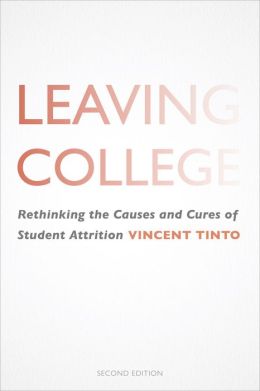
2.
Tinto, Vincent.
Vincent
Tinto’s Leaving College : Rethinking the Causes and Cures of Student Attrition.
Chicago: U of Chicago, 1987. N. pag.print. 3. This book is a detailed exploration of the many reasons students choose to drop out of school. This goes through every possible explanation for the drop-out rates and offers some prevention methods as well as methods on how to make students feel more welcome. The big point is that the main reason college students leave college is because of a lack of adequate social interaction and connectivity with their school.
4. Vincent Tinto is a professor of Education and Sociology at Syracuse University. This book is widely read and recognized and has gotten many awards. There is extensive information about him here: http://soe.syr.edu/about/member.aspx?fac=64
5. Key Terms:
1. Leavers: This refers to the students who eventually drop out of college.
2. Persisters: Refers to the students who overcome all of the adversary factors and graduate college
6. Quotes:
1. “The absence of sufficient contact with other members of the institution proves to be the single most important predictor of eventual departure” (56).
2. “Many isolates relied more heavily on high school friends, family, or friends from work. Over time it grew more unlikely that these women would form friendships on campus” (110).
3. “Voluntary leavers were much less likely than were persisters to identify someone on campus with whom they had a significant relationship and or served as a significant definer of their actions” (56).
7. This book is important as one of the main components of my paper is the effect of social isolation on low-income college students' mental health and success in college. It provides a framework for just how influential social interaction and a sense of belonging is in every students' experience in college. Tinto just puts social isolation and its effect on mental health into perspective by his assertion that it is the single most important indicator in whether or not a student will complete college.

